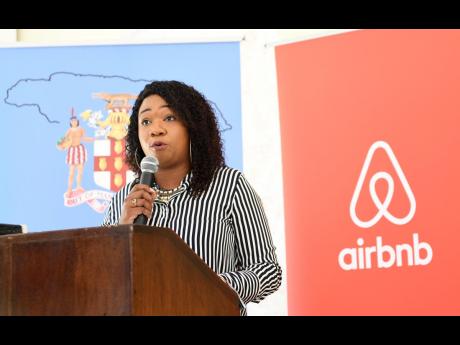AIRBNB ENVY - Gov’t, Opposition wary as hoteliers criticised for demanding tax on short-lease owners
Small-scale Jamaican property owners providing hospitality services on the Airbnb platform have received support from both sides of the legislature against continuing howls that their operations should be drafted into the tax net.
Wayne Cummings, a past president and council member of the Jamaica Hotel and Tourist Association (JHTA), renewed the call for a levy to be imposed on the unregulated operators while addressing the International Realtors Conference and Expo in Montego Bay, St James, recently .
“What we are concerned about is that if those of us who follow the rule of law as taxpayers, from the room taxes straight through to the general consumption tax, then we ought to make sure that everyone else within their space, within what is prescribed for them to pay, is being abided by,” said Cummings, a senior executive at Sandals Resorts International. “Some of those persons are hiding under the guise of being a home resident. That is something that we have to grapple with.”
Jamaica currently has approximately 10,000 short-term rentals listed with the platform and welcomed about 89,000 visitors in 2018 – 39,000 more than were booked for Airbnb stays the previous year – with an average spend of US$2,600.
“I am a little wary whether this is not a self-serving argument to restrict the competition and create barriers for entry into the tourism business,” said Mark Golding, the opposition spokesman on finance.
“My personal view is that we need a tourism industry that is more integrated into the economy, not less. More Jamaicans must benefit from tourism, not just hotel investors.”
Golding added: “Every hotelier in Jamaica that has been operating for more than five years has benefited under the old regime, so for them to be saying ‘tax these small entrepreneurs’, when they, the big guys, benefited from years of incentives – in some cases for decades – is somewhat disingenuous.”
When contacted, Tourism Minister Edmund Bartlett was unwilling to comment, as he was preparing to leave the island for Nepal to discuss the proposed establishment of a satellite Global Tourism Resilience and Crisis Management Centre in that country.
However, in May 2019, Bartlett told The Gleaner that Airbnb operators in Jamaica would not be taxed, and that negotiations would instead take place with the United States-based homestay providers for them to pay a cess to government.
“We are not going after direct taxation to impact the hosts who are, by and large, the small entrepreneurs of our country who are making the inclusiveness of tourism something real,” Bartlett said then. “… But rather, we are looking at a broader picture to see how Airbnb itself can partner with Jamaica to provide the necessary resource support for the many projects we have, particularly in destination-assurance strategies which are being developed.”
Now, a high-ranking government official, who spoke on condition of anonymity, is agreeing with Golding’s assessment.
“As the Government, we have done our work in terms of these business modules that have emerged, and more of them are going to come. The truth is, it’s not affecting them because the industry is growing so fast and the hotels are making money,” the Government official said.
“Airbnb are new models and, with the level of technology that is available now, it is going to cause more disruptive models in the tourism, as well as other industries.”
The source continued: “Jamaica and other governments will be challenged to identify ways and means on how to ensure that there is a taxation arrangement that covers everybody.”
But Sherie-Ann Anderson, president of the Jamaica Home Sharing Association, wants to find an amicable solution.
“Due to the unique nature of the home-sharing/Airbnb business, we would want to negotiate on behalf of our members for an arrangement,” Anderson said.
“Ultimately we are willing to work with all stakeholders involved to do what is best of all parties involved. Overall, we want a win-win situation where tourism entrepreneurs are still able to operate their business and have a source of income.”
For forensic auditor Collin Greenland, who spent more than two decades at the Jamaica Tourist Board (JTB), Airbnb operators should be enjoying similar tax exemptions as the bigger players.
“One of the problems the tourism industry has had is how to spread the product outside of the big players so that the common man shares in the profits,” Greenland said.
“If you have given so many benefits to the big boys for them to grow, you would be sending the wrong message if you don’t give the small operators similar exemptions.”
He added. “I have worked with political administrations and it is the one industry that, despite government change, remains intact … they don’t play politics with it.”


